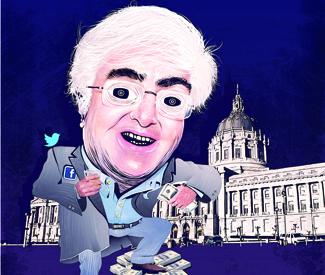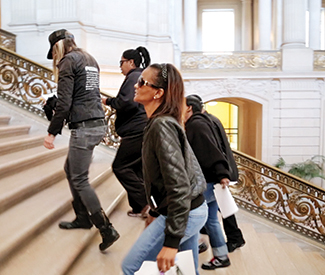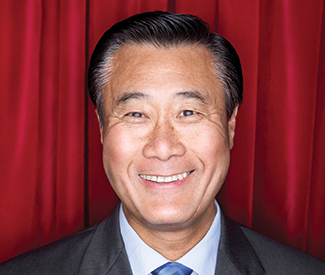OUR CLEAN SLATE VOTERS GUIDE TO TAKE TO THE POLLS IS HERE.
Editor’s Note: Election endorsements have been a long and proud part of the Guardian’s 48-year history of covering politics in San Francisco, the greater Bay Area, and at the state level. In low-turnout elections like the one we’re expecting in June, your vote counts more than usual, and we hope our endorsements and explanations help you make the best decisions.
GOVERNOR: JERRY BROWN
There is much for progressives to criticize in Jerry Brown’s latest stint as governor of California. He has stubbornly resisted complying with federal court orders to substantially reduce the state’s prison population, as well as shielding the system from needed journalistic scrutiny and reforms of solitary confinement policies that amount to torture. Brown has also refused to ban or limit fracking in California, despite the danger it poses to groundwater and climate change, irritating environmentalists and fellow Democrats. Even Brown’s great accomplishment of winning passage for the Prop. 30 tax package, which eased the state back from financial collapse, sunsets too early and shouldn’t have included a regressive sales tax increase. Much more needs to be done to address growing wealth disparities and restore economic and educational opportunity for all Californians.
For these reasons and others, it’s tempting to endorse one of Brown’s progressive challenges: Green Party candidate Luis Rodriguez or Peace and Freedom Party candidate Cindy Sheehan (see “Left out,” April 23). We were particularly impressed by Rodriguez, an inspiring leader who is seeking to bring more Latinos and other marginalized constituencies into the progressive fold, a goal we share and want to support however we can.
But on balance, we decided to give Brown our endorsement in recognition of his role in quickly turning around this troubled state after the disastrous administration of Arnold Schwarzenegger — and in the hope that his strong leadership will lead to even greater improvement over his next term. While we don’t agree with all of his stands, we admire the courage, independence, and vision that Brown brings to this important office. Whether he is supporting the California High-Speed Rail Project against various attacks, calling for state residents to live in greater harmony with the natural world during the current drought, or refusing to shrink from the challenges posed by global warming, Jerry Brown is the leader that California needs at this critical time.
LIEUTENANT GOVERNOR: GAVIN NEWSOM
Gavin Newsom was mayor of San Francisco before he ascended to the position of Lieutenant Governor, and we at the Bay Guardian had a strained relationship with his administration, to put it mildly. We disagreed with his fiscally conservative policies and tendency to align himself with corporate power brokers over neighborhood coalitions. As lieutenant governor, Newsom is tasked with little — besides stepping into the role of governor, should he be called upon to do so — but has nevertheless made some worthwhile contributions.
Consider his stance on drug policy reform: “Once and for all, it’s time we realize that the war on drugs is nothing more than a war on communities of color and on the poor,” he recently told a crowd at the Democratic Party convention in Los Angeles. “It is fundamentally time for drug policies that recognize and respect the full dignity of human beings. We can’t wait.” In his capacity as a member of the UC Board of Regents, Newsom recently voted against a higher executive compensation package for a top-level administrator, breaking from the pack to align with financially pinched university students. In Sacramento, Newsom seems to come off as more “San Francisco” than in his mayoral days, and we’re endorsing him against a weak field of challengers.
SECRETARY OF STATE: DEREK CRESSMAN
Although the latest Field Poll shows that he has only single-digit support and is unlikely to make the November runoff, we’re endorsing Derek Cressman for Secretary of State. As a longtime advocate for removing the corrupting influence of money from politics through his work with Common Cause, Cressman has identified campaign finance reform as the important first step toward making the political system more responsive to people’s needs. As Secretary of State, Cressman would be in a position to ensure greater transparency in our political system.
We also like Alex Padilla, a liberal Democrat who has been an effective member of the California Senate. We’ll be happy to endorse Padilla in November if he ends up in a runoff with Republican Pete Peterson, as the current polling seems to indicate is likely. But for now, we’re endorsing Cressman — and the idea that campaign finance reform needs to be a top issue in a state and country that are letting wealthy individuals and corporations have disproportionate influence over what is supposed to be a democracy.
CONTROLLER: BETTY YEE
The pay-to-play politics of Leland Yee and two other California Democrats has smeared the Assembly. Amid the growls of impropriety, a report by the Center for Investigative Reporting has painted Speaker of the Assembly John Perez, a leading candidate for Controller, with a similar brush. CIR revealed Perez raised money from special interest groups to charities his lover favored, a lover later sued for racketeering and fraud.
Betty Yee represents an opportunity for a fresh start. On the state’s Board of Equalization she turned down campaign donations from tobacco interests, a possible conflict of interest. She also fought for tax equity between same-sex couples. The Controller is tasked with keeping watch on and disbursing state funds, a position we trust much more to Yee’s careful approach than Perez’s questionable history. Vote for Yee.
TREASURER: JOHN CHIANG
While serving as California’s elected Controller, John Chiang displayed his courage and independence by refusing to sign off on budgetary tricks used by then-Gov. Arnold Schwarzenegger and some legislative leaders, insisting on a level of honesty that protected current and future Californians. During those difficult years — as California teetered on the brink of bankruptcy, paralyzed by partisan brinksmanship each budget season, written off as a failed state by the national media — Chiang and retiring Treasurer Bill Lockyer were somehow able to keep the state functioning and paying its bills.
While many politicians claim they’ll help balance the budget by identifying waste and corruption, Chiang actually did so, identifying $6 billion by his estimate that was made available for more productive purposes. Now, Chiang wants to continue bringing fiscal stability to this volatile state and he has our support.
ATTORNEY GENERAL: KAMALA HARRIS
Kamala Harris has kept the promise she made four years ago to bring San Francisco values into the Attorney General’s Office, focusing on the interests of everyday Californians over powerful vested interests. That includes strengthening consumer and privacy protections, pushing social programs to reduce criminal recidivism rather than the tough-on-crime approach that has ballooned our prison population, reaching an $18 billion settlement with the big banks and mortgage lenders to help keep people in their homes, and helping to implement the Affordable Care Act and the legalization of same-sex marriage in the state.
Harris has maintained her opposition to the death penalty even though that has hurt her in the statewide race, and she brings to the office an important perspective as the first woman and first African American ever to serve as the state’s top law enforcement officer. While there is much more work to be done in countering the power of wealthy individuals and corporations and giving the average Californian a stronger voice in our legal system, Harris has our support.
INSURANCE COMMISSIONER: DAVE JONES
We’ve been following Dave Jones’s legislative career since his days on the Sacramento City Council and through his terms in the California Legislature, and we’ve always appreciated his autonomy and progressive values. He launched into his role as Insurance Commissioner four years ago with an emergency regulation requiring health insurance companies to use no more than 20 percent of premiums on profits and administrative costs, and he has continued to do what he can to hold down health insurance rates, including implementing the various components of the Affordable Care Act.
More recently, Jones held hearings looking at whether Uber, Lyft, and other transportation network companies are adequately insured to protect both their drivers and the general public, concluding that these companies need to self-insure or otherwise expand the coverage over their business. It was a bold and important move to regulate a wealthy and prosperous new industry. Jones deserves credit for taking on the issue and he has earned our endorsement.
SUPERINTENDENT OF SCHOOLS: TOM TORLAKSON
This race is a critical one, as incumbent Tom Torlakson faces a strong challenge from the charter school cheerleader Marshall Tuck. An investment banker and Harvard alum, Tuck is backed by well-heeled business and technology interests pushing for the privatization of our schools. Tech and entertainment companies are pushing charter schools heavily as they wait in the wings for lucrative education supply contracts, for which charter schools may open the doors. And don’t let Waiting for Superman fool you, charter schools’ successful test score numbers are often achieved by pushing out underperforming special needs and economically disadvantaged students.
As national education advocate Diane Ravitch wrote in her blog, “If Tuck wins, the privatization movement will gain a major stronghold.” California ranks 48th in the nation in education spending, a situation we can thank Prop. 13 for. We’d like to see Torlakson advocate for more K-12 school dollars, but for now, he’s the best choice.
BOARD OF EQUALIZATION: FIONA MA
Fiona Ma was never our favorite member of the San Francisco Board of Supervisors, and in the California Legislature, she has seemed more interested in party politics and leadership than moving legislation that is important to San Francisco. There are a few exceptions, such as her attempts last year to require more employers to offer paid sick days and to limit prescription drug co-payments. But she also notoriously tried to ban raves at public venues in 2010, a reactionary bill that was rejected as overly broad.
But the California Board of Equalization might just be a better fit for Ma than the Legislature. She’s a certified public accountant and would bring that financial expertise to the state’s main taxing body, and we hope she continues in the tradition of her BOE predecessor Betty Yee in ensuring the state remains fair but tough in how it collects taxes.
ASSEMBLY, DISTRICT 17: DAVID CAMPOS
The race to replace progressive hero Tom Ammiano in the California Assembly is helping to define this important political moment in San Francisco. It’s a contest between the pragmatic neoliberal politics of Board of Supervisors President David Chiu and the populist progressive politics of Sup. David Campos, whom Ammiano endorsed to succeed him.
It’s a fight for the soul of San Francisco, a struggle to define the values we want to project into the world, and, for us at the Bay Guardian, the choice is clear. David Campos is the candidate that we trust to uphold San Francisco’s progressive values in a state that desperately needs that principled influence.
Chiu emphasizes how the two candidates have agreed on about 98 percent of their votes, and he argues that his effectiveness at moving big legislation and forging compromises makes him the most qualified to represent us in Sacramento. Indeed, Chiu is a skilled legislator with a sharp mind, and if “getting things done” — the prime directive espoused by both Chiu and Mayor Ed Lee — was our main criterion, he would probably get our endorsement.
But when you look at the agenda that Chiu and his allies at City Hall have pursued since he came to power — elected as a progressive before pivoting to become a pro-business moderate — we wish that he had been a little less effective. The landlords, tech titans, Realtors, and Chamber of Commerce have been calling the shots in this city, overheating the local economy in a way that has caused rapid displacement and gentrification.
“Effective for whom? That’s what’s important,” Campos told us during his endorsement interview, noting that, “Most people in San Francisco have been left behind and out of that prosperity.”
Campos has been a clear and consistent supporter of tenants, workers, immigrants, small businesses, environmentalists — the vast majority of San Franciscans, despite their lack of power in City Hall. Chiu will sometimes do right by these groups, but usually only after being pushed to do so by grassroots organizing and lobbying efforts.
Campos correctly points out that such lobbying is more difficult in Sacramento, with its higher stakes and wider range of competing interests, than it is on the local level. Chiu’s focus on always trying to find a compromise often plays into the hands of wealthy interests, who sometimes just need to be fought and stopped.
We have faith in Campos and his progressive values, and we believe he will skillfully carry on the work of Ammiano — who is both an uncompromising progressive and an effective legislator — in representing San Francisco’s values in Sacramento.
ASSEMBLY, DISTRICT 19: PHIL TING
Incumbent Phil Ting doesn’t have any challengers in this election, but he probably would have won our support anyway. After proving himself as San Francisco’s Assessor, taking a strong stance against corporate landowners and even the Catholic Church on property assessments, Ting won a tough race against conservative businessman Michael Breyer to win his Assembly seat.
Since then, he’s been a reliable vote for legislation supported by most San Franciscans, and he’s sponsoring some good bills that break new ground, including his current AB 1193, which would make it easier to build cycletracks, or bike lanes physically separated from cars, all over the state. He also called a much-needed Assembly committee hearing in November calling out BART for its lax safety culture, and we hope he continues to push for reforms at that agency.
PROPOSITION 41: YES
Over a decade ago, Californians voted to use hundreds of millions of our dollars to create the CalVet Home and Farm Loan Program to help veterans purchase housing. But a reduction in federal home loan dollars, the housing crisis, and a plummeting economy hurt the program.
Prop. 41 would repurpose $600 million of those bond funds and raise new money to create affordable housing rental units for some of California’s 15,000 homeless veterans. This would cost Californians $50 million a year, which, as proponents remind us, is one-tenth of 1 percent of the state budget. Why let hundreds of millions of dollars languish unused? We need to reprioritize this money to make good on our unfulfilled promises to homeless veterans.
PROPOSITION 42: YES
This one’s important. Last year, Gov. Jerry Brown sought to gut the California Public Records Act by making it optional for government agencies to comply with many of the requirements built into this important transparency law. The CPRA and the Ralph M. Brown Act require government agencies to make records of their activities available for public scrutiny, and to provide for adequate notice of public meetings. Had the bill weakening these laws not been defeated, it would have removed an important defense against shadowy government dealings, leaving ordinary citizens and journalists in the dark.
Prop. 42 is a bid to eliminate any future threats against California’s important government transparency laws, by expressly requiring local government agencies — including cities, counties, and school districts — to comply with all aspects of the CPRA and the Brown Act. It also seeks to prevent local agencies from denying public records requests based on cost, by eliminating the state’s responsibility to reimburse local agencies for cost compliance (the state has repeatedly failed to do so, and local bureaucracies have used this as an excuse not to comply).
SF’S PROPOSITION A: YES
Prop. A is a $400 million general obligation bond measure that would cover seismic retrofits and improvements to the city’s emergency infrastructure, including upgrades to the city’s Emergency Firefighting Water System, neighborhood police and fire stations, a new facility for the Medical Examiner, and seismically secure new structures to house the police crime lab and motorcycle unit.
The Board of Supervisors voted unanimously to place Prop. A on the ballot, and a two-thirds majority vote is needed for it to pass. Given that San Franciscans can expect to be hit by a major earthquake in the years to come, upgrading emergency infrastructure, especially the high-pressure water system that will aid the Fire Department in the event of a major blaze, is a high priority.
SF’S PROPOSITION B: YES
As we report in this issue (see “Two views of the waterfront”), San Francisco’s waterfront is a valuable place targeted by some ambitious development schemes. That’s a good thing, particularly given the need that the Port of San Francisco has for money to renovate or remove crumbling piers, but it needs to be carefully regulated to maximize public benefits and minimize private profit-taking.
Unfortunately, the Mayor’s Office and its appointees at the Port of San Francisco have proven themselves unwilling to be tough negotiators on behalf of the people. That has caused deep-pocketed, politically connected developers to ignore the Waterfront Land Use Plan and propose projects that are out-of-scale for the waterfront, property that San Francisco is entrusted to manage for the benefit of all Californians.
All Prop. B does is require voter approval when projects exceed existing height limits. It doesn’t kill those projects, it just forces developers to justify new towers on the waterfront by providing ample public benefits, restoring a balance that has been lost. San Francisco’s waterfront is prime real estate, and there are only a few big parcels left that can be leveraged to meet the needs of the Port and the city. Requiring the biggest ones to be approved by voters is the best way to ensure the city — all its residents, not just the politicians and power brokers — is getting the best deals possible.
SF SUPERIOR COURT JUDGE: DANIEL FLORES
Daniel Flores has an impressive list of endorsers, including the Democratic, Republican, and Green parties of San Francisco — a rare trifecta of political party support. But don’t hold the GOP nod against Flores, who was raised in the Excelsior by parents who immigrated from El Salvador and who interned with La Raza Centro Legal while going to McGeorge School of Law. And he did serve in the Marines for six years, which could explain the broad range of support for him.
Flores is a courtroom litigator with experience in big firms and his own practice, representing clients ranging from business people to tenants fighting against their landlords. Flores told us that he wants to ensure those without much money are treated fairly in court, an important goal we support. We also liked Kimberly Williams and hope she ends up on the bench someday, but in this race, Flores is the clear choice.
CONGRESS, DISTRICT 12: NANCY PELOSI
This was a hard decision for us this year. Everyone knows that Pelosi will win this race handily, but in past races we’ve endorsed third party challengers or even refused to endorse anyone more often than we’ve given Pelosi our support. While Pelosi gets vilified by conservatives as the quintessential San Francisco liberal, she’s actually way too moderate for our tastes.
Over her 21 years in Congress, she has presided over economic policies that have consolidated wealth in ever fewer hands and dismantled the social safety net, environmental policies that have ignored global warming and fed our over-reliance on the private automobile, and military policies that expanded the war machine and overreaching surveillance state, despite her insider’s role on the House Intelligence Committee.
Three of her opponents — Democrat David Peterson, Green Barry Hermanson, and fiery local progressive activist Frank Lara of the Peace and Freedom Party — are all much better on the issues that we care about, and we urge our readers to consider voting for one of them if they just can’t stomach casting a ballot for Pelosi. In particular, Hermanson has raised important criticisms of just how out of whack our federal budget priorities are. We also respect the work Lara has done on antiwar and transit justice issues in San Francisco, and we think he could have a bright political future.
But we’ve decided to endorse Pelosi in this election for one main reason: We want the Democrats to retake the House of Representatives this year and for Pelosi to once again become Speaker of the House. The Republican Party in this country, particularly the Tea Party loyalists in the House, is practicing a dangerous and disgusting brand of political extremism that needs to be stopped and repudiated. They would rather shut the government down or keep it hopelessly hobbled by low tax rates than help it become an effective tool for helping us address the urgent problems that our country faces. Pelosi and the Democrats aren’t perfect, but at least they’re reasonable grown-ups and we’d love to see what they’d do if they were returned to power. So Nancy Pelosi has our support in 2014.
CONGRESS, DISTRICT 13: BARBARA LEE
Barbara Lee has been one of our heroes since 2001, when she was the only member of Congress to vote against the Authorization for the Use of Military Force Against Terrorists, braving the flag-waving nationalism that followed the 9/11 attacks on the World Trade Center and Pentagon to warn that such an overly broad declaration of war was dangerous to our national interests. She endured death threats and harsh condemnation for that principled stand, but she was both courageous and correct, with our military overreach still causing problems for this country, both practical and moral.
Lee has been a clear and consistent voice for progressive values in the Congress for 16 years, chairing both the Congressional Black Caucus and Congressional Progressive Caucus, taking stands against capital punishment and the Iraq War, supporting access to abortions and tougher regulation of Wall Street, and generally representing Oakland and the greater Bay Area well in Washington DC. She has our enthusiastic support.
CONGRESS, DISTRICT 14: JACKIE SPEIER
Jackie Speier has given her life to public service — almost literally in 1978 when she was an aide to then-Rep. Leo Ryan and survived the airstrip shootings that triggered the massacre at Jonestown — and she has earned our ongoing support. Speier has continued the consumer protection work she started in the California Legislature, sponsoring bills in Congress aimed at protecting online privacy. She has also been a strong advocate for increasing federal funding to public transit in the Bay Area, particularly to Muni and for the electricification of Caltrain, an important prelude to the California High-Speed Rail Project. In the wake of the deadly natural gas explosion in San Bruno, Speier has pushed for tough penalties on Pacific Gas & Electric and expanded pipeline safety programs. She has been a strong advocate of women’s issues, including highlighting the epidemic of sexual assault on college campuses and in the military, seeking greater protections, institutional accountability, and recourse for victims. More recently, Speier has become a key ally in the fight to save City College of San Francisco, taking on the federal accreditation process and seeking reforms. Speier is a courageous public servant who deserves your vote.
















 What began with the FBI investigating a murder and leadership transition in the San Francisco branch of the ancient Chinese organized crime syndicate known as the Triad, led by an undercover FBI agent who had infiltrated the group, evolved into a widening investigation accusing Yee of arranging an illegal arms trafficking deal with a Muslim rebel group in the Philippines in exchange for $100,000 funneled into his campaign, on top of smaller favors that Yee allegedly did in exchange for envelopes with $10,000 in cash.
What began with the FBI investigating a murder and leadership transition in the San Francisco branch of the ancient Chinese organized crime syndicate known as the Triad, led by an undercover FBI agent who had infiltrated the group, evolved into a widening investigation accusing Yee of arranging an illegal arms trafficking deal with a Muslim rebel group in the Philippines in exchange for $100,000 funneled into his campaign, on top of smaller favors that Yee allegedly did in exchange for envelopes with $10,000 in cash.